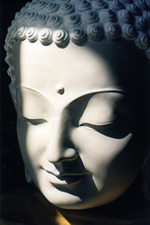Basic Buddhism
Whatever
the school or sect or approach, Buddhism is based on a few principles. These principles
can be quite satisfying intellectually. They can seem to make pretty good common
sense. But the principles of Buddhism are not aimed at satisfying the intellect
so much. They are aimed at offering people a way to lead a happier and more peaceful
life. To be happier and more peaceful is not an intellectual matter. It is a matter
of experience.
The principles or suggestions or observations that Buddhism
makes are these: First, all things change. Because all things change always, the
person called "I" or "me" is constantly changing too. In fact
there is no such thing as an abiding "I" or "me." There is
only change. While this observation may make good intellectual sense, it can be
pretty upsetting. If a whole life has been devoted to creating a sense of who
"I" am, then realizing "I" am a figment of imagination . .
. whoa mama! If I am not "I," then who am I?
The fact that everything
changes means that individuals are nudged by doubt. What was good becomes bad,
what was happy becomes sad, what was true becomes false, what was birth becomes
death, what was love becomes anger, what was rich becomes impoverished. The pendulum
swings back and forth. Whatever its joys and sorrows, this life can be pretty
uncertain. The uncertainty and doubt that change can seem to create are called
suffering by Buddhists.
Shakyamuni Buddha (he's the one people generally mean
when they say "the Buddha") addressed suffering by making observations
and suggestions that form another of the principles that underlie all schools
of Buddhism. These observations are called The Four Noble Truths.
The Four
Noble Truths are: There is suffering (anxiety/uncertainty/doubt). There is a cause
of suffering. There is an end to suffering. There is a way to end suffering.
Thus,
all schools of Buddhism, whatever the sect, subscribe to the notions that all
things change and The Four Noble Truths. These two suggest that first there is
observation and second there is a framework (Buddhism) within which to rethink
that observation.
Up to this point, things can remain intellectual, or belief-oriented.
This realm may form the basis for a lot of good discussions. They are food for
thought. But food for thought is different from experience, different from actually
leading a happier and more peaceful life. So there is another element that all
Buddhist schools subscribe to. This is called the Eightfold Path and refers to
the last of The Four Noble Truths (a way to end suffering).
The Eightfold
Path is sometimes described this way: Right view, right intention, right speech,
right action, right livelihood, right effort, right mindfulness and right concentration.
The word "right" can sometimes suggest - particularly in cultures
woven with Christianity - a sense of "wrong" or "bad" or something
similar. Perhaps the word "complete" would be a little easier to swallow
from the point of view of someone whose life seems to lack completeness. Buddhism
is not a threat-based process. You won't go to heaven if you decide to practice
and you won't go to hell if you don't. Buddhism merely points out facts and makes
suggestions based on those facts.
The Eightfold Path points out ways to put
what has been observed and reflected upon into action. These are practical suggestions
as outlined by practical men and women. Like the parent who instructs a child
about how to ride a bike, the Eightfold Path suggests ways in which to actually
experience a happier and more peaceful life.
Perhaps the most arresting facet
of Buddhism (when seen from the outside) is the meditation it encourages. By ordinary
standards, it may look weird or holy or masochistic or self-centered . . . a world
of belly-button lint and foreign languages. But meditation is just a tool for
experience. Without experience, things remain intellectual, incomplete, and limited.
What is limited will always contain a doubt. Meditation offers a way to dispel
doubt. There are other tools as well, as the Eightfold Path points out, but meditation
is also suggested.
So, these are the basics of Buddhism: Observation, reflection,
action; pay attention and take responsibility. On top of such basics, there are
schools and sects, temples and uniforms, texts and talks, rituals and rites. Buddhism
does not exist in order to enlarge or improve or adorn some fantasy called "Buddhism."
It is just a human world and as such has its successes and flops. But there is
one thing remains constant throughout - your own unlimited, and peaceful life.
I wish you the best.  Home
Home
 Home
Home